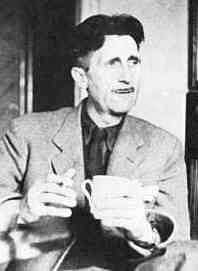
1903-1950
Freedom
is the freedom to say that two plus two make four.
If that is granted, all else follows.
Nineteen
Eighty-Four
George Orwell er stadig – 50 år efter sin død – værd at læse. Nye
generationer af læsere begejstres over hans bøger, vel især Animal
Farm og Nineteen Eighty-Four, men også over hans andre værker,
som læsningen af de to førstnævnte bøger ofte fører med sig.
Selvom Orwell nok er mest kendt som romanforfatter, er hans essays blandt de
bedste i det 20. århundrede. Han var ophavsmand til begreber og
vendinger, der blev en så integreret del af det 20. århundredes kultur,
at folk kendte til dem og forstod betydningen af dem uden nødvendigvis at
vide noget om Orwell, f.eks. Big Brother is watching you, Newspeak,
doublethink og All animals are equal, but some animals are more
equal than others. Han skrev desuden avisartikler og anmeldelser,
mestendels for at få brød på bordet.
I Orwells essays forenedes et politisk sigte med litterære ambitioner i
hans kritik af bureaukratiske institutioner, den kulturelle og politiske
elite og ikke mindst den i hans øjne omsiggribende totalitarisme. Hans
essays er samtidigt historiske dokumenter, idet Orwell var meget tæt på
tidens vigtige begivenheder. Han havde som politimand i Burma været en
del af det imperialistiske undertrykkelsesapparat. Han havde levet som
vagabond og blandt minearbejdere under Depressionen. Han havde kæmpet mod
fascismen i Spanien og senere arbejdet for bl.a. BBC under 2. verdenskrig.
Og han skrev på basis af sine egne erfaringer. Sidst, men bestemt ikke
mindst, øste Orwell i sine essays og artikler af sin store viden om snart
sagt hvad som helst og delte sin begejstring over livets små detaljer med
læserne.
Fifty years after his death, George Orwell is still worth reading. New generations of readers enjoy his books, particularly Animal Farm and Nineteen-Eighty Four, but also his other works that the reading of the two first-mentioned often leads to.
Though Orwell is primarliy known as a writer of novels, his essays are among the best of the 20th century. He fathered concepts and turn of phrases that became so integral a part of 20th-century culture that people knew them and understood their meaning without necessarily knowing anything about Orwell, e.g. Big Brother is watching you, Newspeak, doublethink and All animals are equal, but some animals are more equal than others. He also wrote articles and reviews, mostly to get food on the table.
In Orwell's essays political purpose and literary ambitions united in his criticism of bureacratic institutions, the cultural and political elite and not least the – in his opinion – increasing totalitarianism. At the same time, his essays are historical documents. As a policeman in Burma he had been part of the oppressive British Empire. He had lived as a tramp and among miners during the Depression. He had fought against fascism in Spain and later worked for among others the BBC during World War 2. And he wrote on the basis of his own experience. Last, but certainly not least, in his essays and articles Orwell shared with his readers his great knowledge about almost anything and his enthusiasm for life's small details.
![]()
![]()
Nord-Korea - virkelighedens 1984/North Korea - the real-world 1984
Patrick
Farley's George Orwell Page
Nineteen
Eighty-Four. Internet Links and Resources